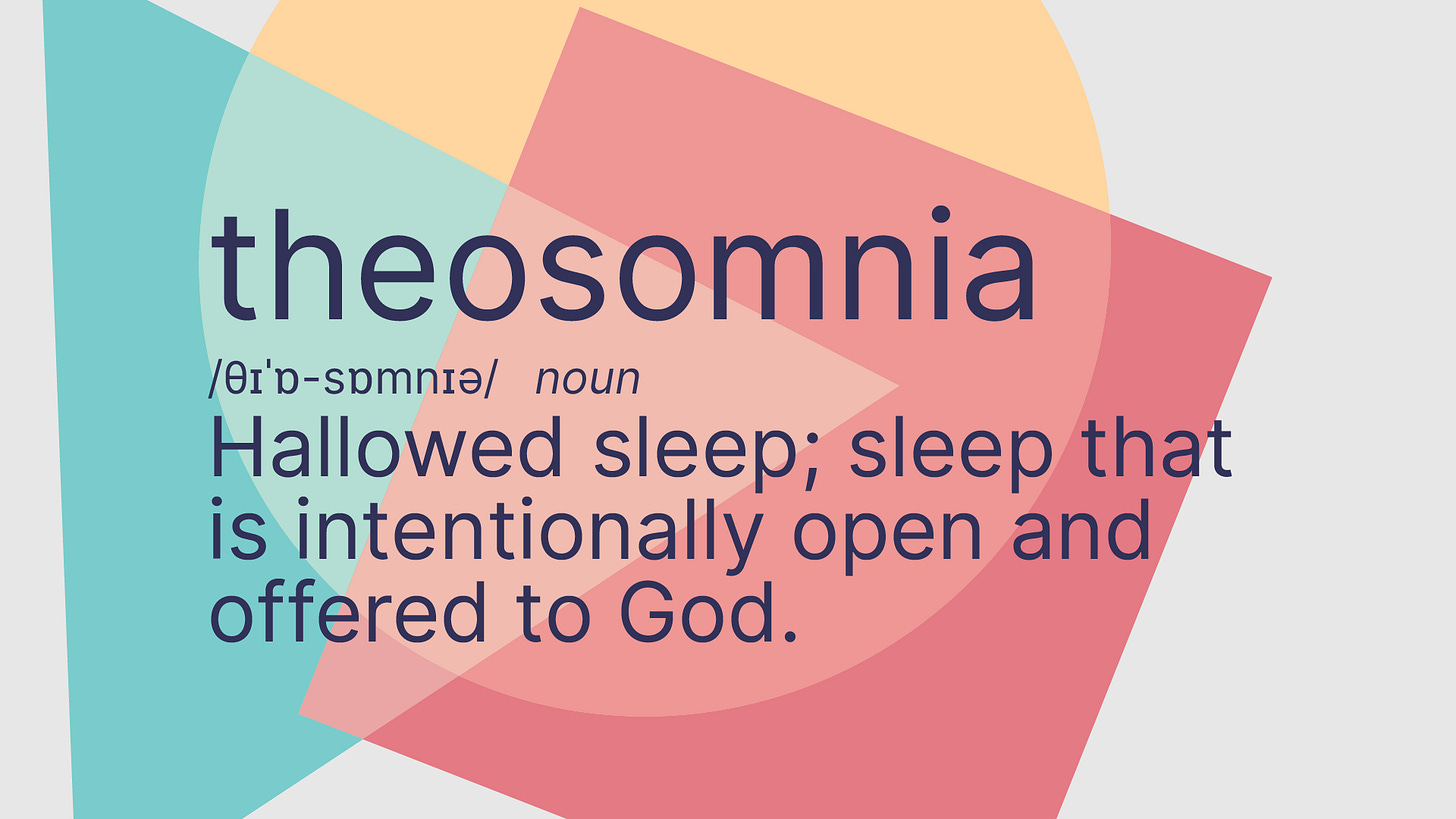Theosomnia: A Theology of Sleep
On the goodness of God-given limitations
We all need sleep. There’s no way around it. Although essential to survival, many of us put off going to bed.
Why did God create us with the need for sleep, and why do we resist it?
Psalm 121 tells us that God does not sleep.1 He has been perfectly alert and attentive for every nanosecond of history. As the source of all life and energy and the sustainer of the universe, God is without that most fundamental human limitation: fatigue.2
Because God is sovereign, we don’t have to be. He is our Creator; we are His creatures. To be a creature means that we must have limitations. We must be less capable than our Creator. This is a good thing. The Fall impacted and distorted our creaturely capacity, but that does not mean limitations are bad in themselves.
God has designed us to need sleep. He didn’t have to, but He did. That means we need to see it as a good thing. It’s not just something that gets in our way. Rather, it prevents us from reaching beyond our God-given boundaries.
Many of us would rather push our bedtime back to get a bit more work done. This is especially tempting if we believe we’re doing it for God. But we were not designed to be limitless. In Psalm 127, Solomon writes,
In vain you rise early and stay up late, toiling for food to eat—for He grants sleep to those he loves.
God does not resent us for what we fail to get done. Rather, He delights in giving us rest.
Staying up late may be worse than folly: it may be sinful. It may be a sinful attempt to wrest back the control that should gladly be relinquished into God's hands, a simple denial about God-given human limitations, and a sinful failure to trust God.3
There is a connection between the vulnerability of sleep and our trust in God.4
The spiritual significance of the physical act of sleep ought to be relational trust that recognises my place as a creature who depends on the grace of a self-sufficient provider. Sleep can express my limitations and creatureliness in a vivid way. I am constitutionally unable to remain in active command of my life without ceasing. I must, at some point, relinquish control, hopefully to my Creator.5
As Christians, we have a high view of the body. We are whole beings and cannot separate our physical wellbeing from our spiritual, emotional, and mental wellbeing. When we care for our bodies by getting enough sleep, we honour God and affirm the goodness of our physicality. When we resist sleep, in some senses, we give into Gnosticism and the creeping desire to escape our physicality and finitude.
Maybe instead of asking yourself whether you can get by with under 7 hours of sleep, the right question may be: Why do I want to get by with under 7 hours of sleep tonight? Why might I feel the need to?
Aside from medication, we cannot control our capacity to sleep. It is a gift from God. This parallels our overall sanctification. We can use formation exercises to create the context and conditions for spiritual growth, but only God can produce that growth.
Is sleep really a spiritual discipline? I’d argue that it is, if we define spiritual disciplines as activities found in Scripture that encourage our devotion to Christ.
Specifically, sleep is the only spiritual discipline that resists being used as a means of earning. There is nothing you can consciously do while sleeping; you are lying there, doing nothing.
We know that we are called to be loving. One thing I discovered when I spent a day trying to live in a loving fashion is that love requires an enormous amount of energy. And I was just too tired to give it. So I realised that—as unspiritual as it sounds—if I was to be a more loving person, I was going to have to get more sleep6
It is much harder to pray when you’re tired. It’s much harder to resist temptation. It’s all-around much harder to follow Jesus when you lack sleep.
In summary, we are creatures who, by definition, live within limitations. When we sleep, we proclaim that Christ is King, and we are not. There are physical benefits to sleep to honour God with our bodies. Sleep is essential for us to be loving followers of Jesus. Ultimately, sleep is a gift from our sovereign and loving God.
Psalm 121v4.
Isaiah 40v28.
Geoff Robson, Thank God for Bedtime, 35.
See Psalm 4v8, Proverbs 3v24, Ecclesiastes 5v12, and Ezekiel 34v23.
Jason McMartin, Sleep, Sloth, and Sanctification, ‘Journal for Spiritual Formation and Soul Care’.
John Ortberg, The Life You’ve Always Wanted, 49.



"There is a connection between the vulnerability of sleep and our trust in God." I've never thought of it that way. Woah. (And goodnight.)
Wow Bethany! Thank you. SO many great thoughts and questions. I really do struggle to lean happily into sleep when I should most nights as I feel there's always more I 'should' be doing to complete my day.
In light of this temptation I face, I've always been challenged at how on in John 17.4 Jesus could say to Father he had *finished/completed* (teleos) all the work had been given...yet there were people not healed, not free, nor living in peace with God and their fellow humans all around him.